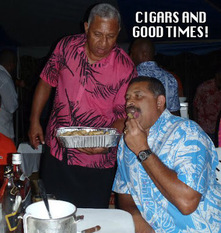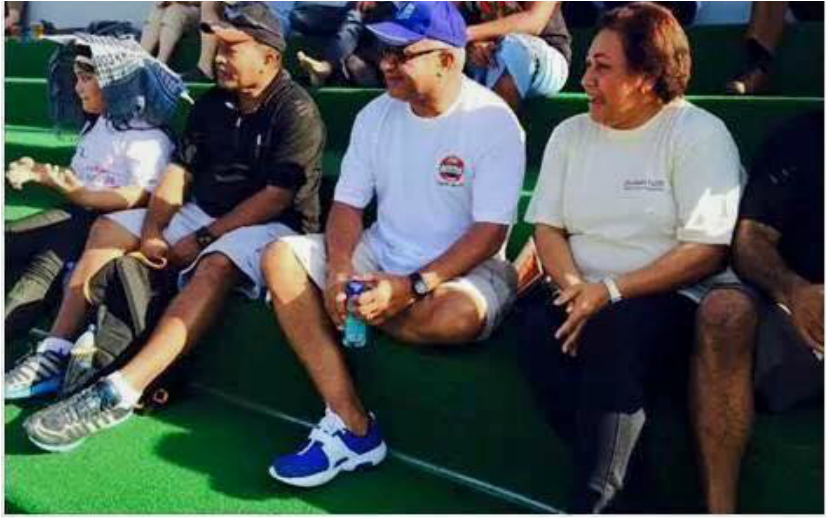
It’s said – ad nauseam – that nations get the governments they deserve and in Fiji’s case it may well be so. But does it have the government it wants? The answer is a resounding: Maybe.
For while the September “election” was carefully crafted over a number of years to deliver the result required by its de facto rulers, the true will of the people remains in doubt. But Fiji’s unhappy reality is that the will of the people matters little when faced with the will of two people.
By any political and/or electoral accounting the record in office of the Bainimarama-Khaiyum junta has been appalling. Who can forget Bainimarama’s list of pledges delivered so solemnly on the eve of December 6, 2006? So much was to be done – and needed to be done. Corruption was to be stamped out. An election was to be held. Interim ministers would not be allowed to stand. Debt was to be reined in. No member of the RFMF was to benefit from this coup. The constitution was to be respected. And so it went.
It was the opening salvo in a campaign of bare-faced lying the like and scale of which have not been seen in regional politics and – in the hopes of many – will not be seen again.
Bainimarama, egged on no doubt by sycophants and self-seekers, has systematically dismantled Fiji’s democracy, replacing it with his brand of “real democracy” – the benighted nation’s newspeak for his own dictatorship.
As we now know the real reason for his 2006 coup – his third attempt – was to keep him out of prison and away from a police murder investigation that was closing in around him. It’s not at all insignificant that one of his first acts as illegal dictator was to have real police officers replaced by his puppets. This was matched by an instruction to have all police files relating to investigations into himself and other senior officers destroyed. In that at least he was unsuccessful. The file was smuggled out of the country shortly after his coup and still exists. But it was to be one of his very few failures.
In what seems likely to become a standard, Rowan Callick’s China study “Party Time”* explores at least in part how the Communist Party of China has sought, with a high degree of success, to control the everyday life of the nation. Callick – also a veteran South Pacific reporter – might well have been referring to Fiji. And, again, it’s not at all insignificant that China is Bainimarama’s best and possibly only true friend, a relationship for which the ordinary people of Fiji are paying dearly and will continue to do so for at least a generation to come.
As in China, everything in Fiji is imposed from on high. The People’s Charter (remember that?) was declared to have been approved by 90 per cent, 87 per cent or 84 per cent of the people depending who was doing the claiming and what day it was. The much-touted People’s Constitution emerged as two people’s constitution after it became clear that “the people” wanted what Frank was not prepared to give – in short, freedom. So the two people’s constitution, like the People’s Charter and much else was simply imposed.
Annual GDP growth is what Frank says it is. The annual Budget continues to be delivered without supporting documents that might give rise to inconvenient questioning. The sugar industry is on its knees. The tourism industry has been degraded. The army consumes more than ever. Progress in education (a vote buyer) has in no way outweighed the disasters elsewhere. The pension fund has become the regime’s piggy bank (and pensions themselves have been slashed in some cases by 60 per cent). Corruption has reached epic proportions as the day of the carpetbagger has well and truly dawned. The list is long – but it doesn’t stop Bainimarama from winning an “election”.
Bainimarama and Khaiyum control the daily life of the nation. Deviation is not permitted in Frank’s Fiji. From the legal system to the monopoly pension fund, all are responsible ultimately to Frank whose word is law.
Who can forget that chilling photograph of the executive, the judiciary, the chief media enforcer and sundry hangers-on smiling smugly at the camera after being unashamedly economical with the truth at the United Nations about the regime’s human rights record? But, again, that is Fiji’s modern-day reality. The executive, the judiciary, the media and police – and indeed all the apparatus of state up to and including the vitally important administration of land – are as one. There is no separation of powers and no accountability.
The “election” was window dressing, intended to give the rest of the world an opportunity to nod approval and resume their aid.
Australia and New Zealand originally led the resistance. So why the abrupt cave-in? The question can probably be answered in one word: China. New Zealand has benefited hugely from its trade agreement with the People’s Republic. A similar deal is one of the major planks of Australia’s foreign policy. And while the importance of China’s increasing presence in the region has probably been overstated by commentators (including this one) in the past, certainly the Pacific’s metropolitan powers could not be expected to let Fiji’s problems interfere with their own vital interests. Bainimarama has played the China card most effectively. And the pious denials of its importance by the political and diplomatic communities are probably in direct proportion to the reality.
Nothing short of a “Fiji Spring” with people on the streets could have made a difference in Canberra or Wellington – or Brussels for that matter. So they endure Bainimarama’s barbs and insults with smiles. His latest and most repeated is his insistence that he will rejoin the Pacific Forum, from which Fiji was expelled after his coup, only on his own terms one of which is that Australia and New Zealand should butt out, while continuing their funding, of course. Time will tell. But it’s a measure of how confident he has become, convinced that the world will dance to his tune. The tragedy is he may well be right, though not for the reasons he might imagine.
At home, he has been blessed with a singularly inept political opposition whose dismal election campaign was not at all justified by the knowledge that the outcome was a foregone conclusion. It evidently still believes, for example, in the efficacy of boycotts.
However, there are signs of people learning in the job and they may yet show at least an inclination to hold Bainimarama to account.
But the dictator’s biggest friend has been the docility of the Fijian people. Lacking a leader, a central focus, the warrior race has been well and truly tamed. Various explanations have been put forward for this. Most no doubt in their own way are relevant. But the fact remains that Fiji has wrung its collective hands while its institutions, laws and culture have been trampled, its interests laughed at, its leading church humbled and insulted, its pension fund looted.
Why would Australia and New Zealand intervene if Fiji’s people won’t?
Bainimarama’s earlier coup attempts were aimed at keeping his job. It was only after he replaced dissenting officers with those more malleable that he began to see the real possibilities. But the police investigation was his final trigger. It was coup or prison.
So once again the military was wheeled out to depose an elected government.
In a classic case of the devil making work for idle hands, Fiji’s military has been the one common denominator in every coup. In the absence of any external threat and without a need for the country to project power, the role of the military pre-2006 was never completely clear. The common criticism that soldiers trained and ate had widespread credence.
Now, however, the army has a primary function. It is to maintain its leader – still Josaia Voreqe Bainimarama – in power. He in return is and will be obliged to pay for that support in cash and kind to the exclusion of other better deserving and more needy purposes.
So the “election” and presence of a parliament changes nothing. The opposition can and should chip away at his power but for the foreseeable future Fiji will remain a dictatorship, buttressed by a self-serving, cowed, supine or in at least a couple of cases cowardly, journalists as well as a self-absorbed and self-interested business community for whom profit will always overcome morality.
On May 14 1987 Sitiveni Rabuka famously declared to a cheering crowd: “Victory is ours”
There are no cheers for Frank Bainimarama but the words are more applicable in 2014 than they were in 1987.
*www.blackincbooks.com
 IN CASE????? Here, you try first, treasonist comrade
IN CASE????? Here, you try first, treasonist comrade You are what you eat - but also how you eat and who you eat with. Food can affect your mood, your bowels and your world-view, write Victoria Clark and Melissa Scott, authors of Dictators' Dinners: A Bad Taste Guide to Entertaining Tyrants.
In this age of the foodie, the gourmand and the gourmet, we have taken a fresh look at some of the worst dictators of the 20th Century by subjecting them to culinary scrutiny. Without seeking to mitigate their crimes by humanising them we wanted to cut them down to human size. The line between man and monster can be very thin.
Although forced to conclude that evil-doing and delusions of grandeur cannot be attributed to the consumption of any single food or any one physical constitution, hints of patterns did emerge.
As many dictators aged they grew more and more obsessed with the purity of what they ate. North Korea's Kim Il-sung had all his rice grains individually selected and created an institute whose sole purpose was to devise ways of prolonging his life.
The Romanian Communist party boss Nicolae Ceausescu irritated foreign leaders he visited by bringing all his food with him - Tito, head of the neighbouring state of Yugoslavia, was shocked by his insistence on drinking raw vegetable juice through a straw, avoiding all solids.
The vast majority of our dictators came of humble, peasant stock which meant that their favourite foods tended to be anything but Cordon Bleu.
For all his lavish hospitality to royalty and stars of stage and screen, Tito loved nothing so much as a slice of warm pig fat, while Ceausescu - when at home - had a weakness for a stew made with a whole chicken… feet, beak and all.
Portugal's piously Catholic Antonio Salazar loved the sardines that reminded him of his impoverished childhood. He recalled having to share a single sardine with a sibling.
Some of our most infamous subjects - Adolf Hitler, Mao Zedong and Benito Mussolini - found the stress of the gigantic responsibilities they had taken upon themselves took a heavy toll on their digestive systems.
Hitler's chronic flatulence may have accounted for his becoming a vegetarian and to his allowing a quack doctor named Theodore Morrell to dose him with as many 28 different medicines, including one made of extract of Bulgarian peasants' faeces.
On the other hand, famously flatulent Muammar Gaddafi seems to have been untroubled by his affliction. Midway through World War Two, a failing Mussolini was examined by a Nazi doctor who pronounced him dangerously constipated.
Mao Zedong, a passionate carnivore, was a lifelong martyr to his bowel movements: "I eat a lot and I excrete a lot," he happily reported in a letter to a comrade in his early days. Much later, on a visit to the USSR to meet Stalin, he would find to his fury that he could not excrete at all - the squatting type of toilet he was used to was unavailable in Moscow.
Comrade Stalin must have had an iron constitution to match his steely name. Around a table groaning with delicious Georgian specialities, mealtimes at his Kuntsevo dacha were prime time for bullying power games.
Lasting five or six hours, from 11pm until 5am for example, they became a refined form of torture thanks to obligatory participation in drinking games, sing-alongs and dancing.
Over-drinking, paralysing fear and cruel teasing once turned a diner like Nikita Khrushchev into a staggering incontinent wreck. Comrade Tito of Yugoslavia could only keep up with the toasting by vomiting into his jacket sleeve.
Ferdinand and Imelda Marcos seem to have enjoyed a slightly less brutal form of power-play than Stalin's - Imelda once commanded the Philippines' entire military top brass to dress in drag for one of her husband's birthday parties.
Evangelically vegetarian, Hitler apparently engaged his eating table companions in chit-chat about goings-on in a Ukrainian abattoir, a topic so revolting that his carnivorous guests were unable to finish their food.
It is hard to imagine Jean Bedel Bokassa of the Central African Republic, Idi Amin of Uganda, or Francisco Nguema of Equatorial Guinea - all of them strongly suspected of indulging in cannibalism - turning a hair at such talk.
We of course do not provide a recipe for the human corpse stuffed with rice and flambeed in gin, cited by Bokassa's former cook, who was somehow unable to recall the sex of the corpse he claimed Bokassa commanded him to prepare.
Food tasters were inevitably de rigueur and highly valued among the cruellest and most paranoid of our subjects. Hitler had a team of 15 female food-tasters on hand throughout the war years - nothing was delivered to his table until the girls had survived for 45 minutes after eating.
Saddam Hussein's delinquent son Uday was beaten up and hurled into jail for the crime of killing one of his father's tasters. Romania's Nicolae Ceausescu never travelled without a high-ranking Securitate officer, who was also a chemist, equipped with a mobile food-testing laboratory.
Ultimately, of course, all the food-tasters, chemists, faddiness and fussiness in the world could not save these men. They all died in the end - and many died violently. Source: BBC, 5 December 2014: http://www.bbc.co.uk/news/magazine-30313326


